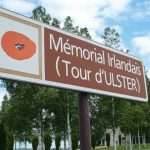In Belfast today, for the first time, an Irish Government minister laid a wreath at the annual ceremony to commemorate the anniversary of the first day of the Battle of the Somme, perhaps the beginning of a process of understanding. Perhaps next year a unionist will take part in the Easter Rising commemorations in Dublin.
The ceremonies give a sense of how much events almost a century ago still mean; how much the past is part of the present.
I have been to the Somme every year for the past four years; for the past three, I have led groups on visits there. There are moments when I think I almost understand what it means, but then my English liberal worldview blurs my thoughts. Standing in the preserved trenches at Thiepval Wood last month, there was a sense of this small patch of French countryside having repercussions down through Irish history.
Perhaps the history of Northern Ireland would have been different if the English government ministers had understood more. They were not bad people; they just had that English view of the world that sees things differently. Had they been schooled in Calvinism, had they some concept of Election, had they understood those Old Testament stories, they might not have made so many mistakes. They would come with their smug assumptions; with their belief that their view was the ‘normal’ one; that if everyone would be decent chaps and all sit down together, then everything would be tikkity-boo. They came having no religion and without comprehension of those who had.
Frank McGuinness understood. Observe the Sons of Ulster Marching Towards the Somme, his drama set on 1st July 1916 captured the intensity, perhaps of 1916, but also what that day has meant in more recent times. McGuinness’ play culminates with a prayer for victory:
(They each begin to put on their Orange sashes. CRAIG watches PYPER, then takes his sash off, goes to MOORE, hands. it to him. MOORE hesitates, then exchanges his sash for CRAIG’s. At this there is an exchange of sashes, CRAWFORD’s for ANDERSON’S, MILLEN’S for MCILWAINE’S. ROULSTON goes to PYPER, who takes ROULSTON’S and gives him his own.)
PYPER: It’s come to this, Roulston?
ROULSTON: What’s decreed passes, Pyper.
PYPER: There’s no fight back?
ROULSTON: There’s just the fight.
PYPER: The good fight?
ROULSTON: The everlasting fight.
PYPER: Inside us?
ROULSTON: And outside us.
PYPER: Preach.
ROULSTON: No. You preach. (Silence. They wait.)
You believe. Believe. (Silence.)
PYPER: God in heaven, if you hear the words of man, I speak to you this day. I do it now to ask we be spared. I do it to ask for strength. Strength for these men around me, strength for myself. If you are a just and merciful God, show your mercy this day. Save us. Save our country. Destroy our enemies at home and on this field of battle. Let this day at the Somme be as glorious in the memory of Ulster as that day at the Boyne, when you scattered our enemies. Lead us back from this exile. To Derry, to the Foyle. To Belfast and the Lagan. To Armagh. To Tyrone. To the Bann and its banks. To Erne and its islands. Protect them. Protect us. Protect me. Let us fight bravely. Let us win gloriously. Lord, look down on us. Spare us. I love – . Observe the sons of Ulster marching towards the Somme. I love their lives. I love my own life. I love my home. I love my Ulster. Ulster. Ulster. Ulster. Ulster. Ulster. Ulster. Ulster. Ulster. (As the chant of’ Ulster’ commences rifles and bayonets are raised. The chant turns into a battle cry, reaching frenzy).
Perhaps it’s a case of those who understand needing no explanation. Perhaps no explanation is possible. Perhaps it’s in the remembering that Ireland is re-membered.
